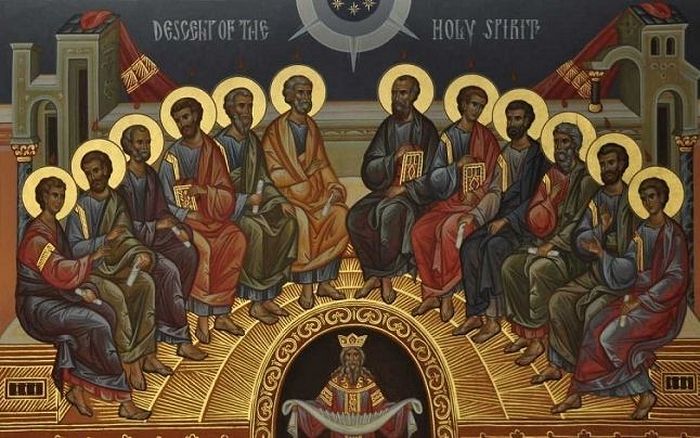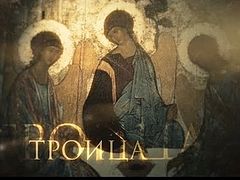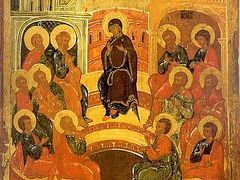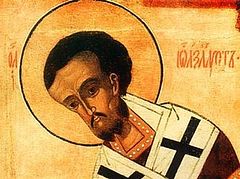The Epistle for the Feast of Pentecost, Acts 2:1-11, gives to us a description of the events which constitute the basis for the Feast.
When the Day of Pentecost had fully come, they were all with one accord in one place. And suddenly there came a sound from heaven, as of a rushing mighty wind, and it filled the whole house where they were sitting. Then there appeared to them divided tongues, as of fire, and one sat upon each of them. And they were all filled with the Holy Spirit and began to speak with other tongues, as the Spirit gave them utterance.
And there were dwelling in Jerusalem Jews, devout men, from every nation under heaven. And when this sound occurred, the multitude came together, and were confused, because everyone heard them speak in his own language. Then they were all amazed and marveled, saying to one another, “Look, are not all these who speak Galileans? And how is it that we hear, each in our own language in which we were born? Parthians and Medes and Elamites, those dwelling in Mesopotamia, Judea and Cappadocia, Pontus and Asia, Phrygia and Pamphylia, Egypt and the parts of Libya adjoining Cyrene, visitors from Rome, both Jews and proselytes, Cretans and Arabs – we hear them speaking in our own tongues the wonderful works of God.”
There is a long standing debate about the events of Pentecost, which the Patristic writers engaged in, long before the modern era. When the disciples were speaking in other languages as described in Acts 2, were they actually speaking in many languages OR was it that the listeners were each able to understand the disciples in the native tongue of the listener? Is the Holy Spirit changing the speech of the apostles, or changing the hearing of those listening to them? Fr. Alexis Trader writes:
“In the patristic literature, two opinions can be discerned concerning the nature of what was heard. The literal interpretation favored by Saint Gregory the Theologian is that the Apostles were not speaking in Hebrew, but in foreign languages. Saint Gregory of Nyssa on the other hand seems to indicate that they were speaking in Hebrew, but that “every man heard them speak in his own language.” Although both interpretations can be supported by the actual text if one is free with the punctuation, both a practical consideration of the event and an understanding of the primary faculty of the soul involved in the working of grace point to the preferability of Saint Gregory of Nyssa’s intuitions.
Saint Gregory the Theologian asserts that the phrase “each one heard them speak in his own language” requires punctuation for the best interpretation. He suggests that a comma should be inserted after the word “heard” so that the text would have the sense “they spoke the languages of those who heard them.” What prompts the Theologian to add this punctuation and provide the text with this interpretation is his pious desire to honor the Holy Apostles. He notes that otherwise this aspect of the miracle would refer to the crowds who were listening rather than to the Apostles who were speaking and that the magnitude of the miracle would be decreased.
An alternative interpretation that Saint Gregory the Theologian himself mentions is that “one voice came forth, but they heard many.” Saint Gregory of Nyssa apparently follows this interpretation when he speaks of the “divine power being portioned out into many languages” for the benefit of all. For Saint Gregory of Nyssa, each person received the one “proclamation in his own dialect…comprehending the meaning of what was said by words familiar to him.” Thus, for Saint Gregory of Nyssa, the words uttered by the Apostle and the words heard by each foreigner were not the same. The Holy Spirit “translated” Saint Peter’s words in the hearts of each listener into his own respective language. This is what leads Saint Gregory of Nyssa to exclaim, “we must realize that the Holy Spirit speaks to us in our own words as we have learned from the narration of Acts” (In Peace Let us Pray to the Lord, pp. 77-80).
This is one of numerous issues on which the Church Fathers actually disagreed in how to interpret the scriptures. Specifically when dogma was not at stake, they didn’t always agree on how to interpret a passage or event in Scripture. They used the gifts of wisdom and knowledge which the Holy Spirit gave them, but sometimes the Spirit did not give them one answer, but rather inspired them to interpret a passage of Scripture according to the wisdom and knowledge given them. This led to them sometime disagreeing on issues that were not doctrinal.
Interpreting the Scriptures meant a real engagement with the text itself to make sense of the text and to derive the fullest meaning and purpose of the text. We see as the Fathers wrestled with the text their willingness to make sense of the text by trying to discern what was the real miracle at work? Is Pentecost about the Holy Spirit uniquely appearing on the Apostles and changing them? Or is the greater miracle that the Spirit’s outpouring was not limited to the Apostles but fell even upon those who were listening to the Apostles speak?





My experience is that it was a miracle of hearing.